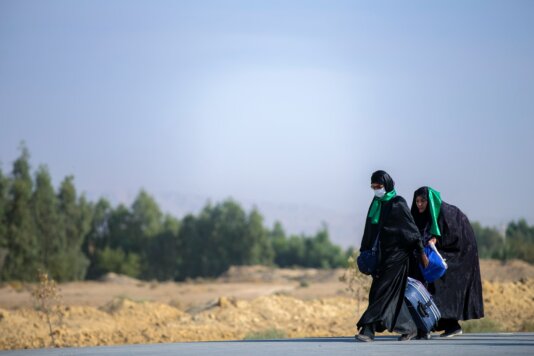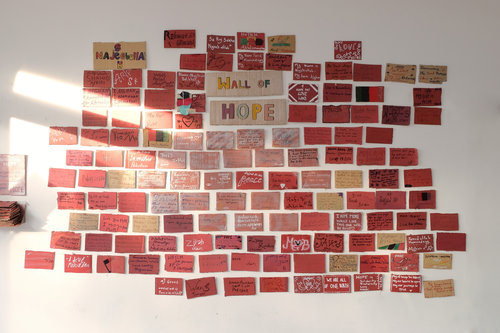- About
- Topics
- Picks
- Audio
- Story
- In-Depth
- Opinion
- News
- Donate
- Signup for our newsletterOur Editors' Best Picks.Send
Read, Debate: Engage.
| June 20, 2022 | |
|---|---|
| topic: | Refugees and Asylum |
| tags: | #Kuwait, #Iraq, #statelessness, #Bedoon |
| located: | Kuwait |
| by: | Frank Odenthal |
There is a reason why many refugees discard their passports before knocking on other nations' doors in search of a safe haven: it is impossible to send them back home when their country of origin cannot be identified. All the while, there are millions of people across the world who are desperate to obtain a passport - but remain stateless.
According to the 1960 UN Convention Relating to the Status of Stateless Persons, a stateless person is one "who is not considered as a national by any state under the operation of its law." As a result, they often have no access education, healthcare or employment, and are unable to open a bank account, purchase a house or even marry. Instead, they face a lifetime of obstacles and disappointment.
People usually acquire a nationality automatically at birth, either through their parents or the country in which they were born. However, when stateless people give birth they pass on their status of statelessness to their children, who subsequently pass it onto the next generation.
Some people are born stateless, while others become stateless throughout their lives. Stateless people are found in all regions of the world, and majority of them were born in the countries in which they have lived their entire lives.
Discrimination on the basis of race, ethnicity, religion, language or gender seem to be the primary drivers of statelessness, while gaps in nationality laws may also be a contributing factor. Every country has its own set of laws establishing the circumstances under which someone becomes eligible for nationality or can have it revoked.
The Bedoon of Kuwait are counted among these stateless groups. The name derives from the Arabic term bedoon jinsiya, which means "without nationality."
The Bedoon are native to the region and frequently crossed borders between neighbouring countries, as bedouins had done in the past; alas, they were never granted nationality following their permanent settlement in Kuwait. Their official status in Kuwait is “illegal residents,” but are regarded as a stateless population from an international law perspective.
Their precise population is difficult to determine, but varys roughly between 120,000 and 250,000 people, depending on the source.
Kuwait is a small Gulf country with just 1.3 million citizens, yet it holds about eight percent of the world’s oil reserves. As the fifth richest country in the world, with a median income of $81,000, Kuwait provides its citizens nearly unparalleled benefits, including free health care, free education on all levels, virtually guaranteed employment and housing grants.
Being stateless in Kuwait means living with many restrictions on fundamental rights, including the right to registration at birth, the right to marry and start a family and the right to travel. As "illegal residents," the Bedoon do not receive civil identification cards, which are necessary for various purposes, including purchasing property, legally registering as an employee and enrolling in most schools or other educational institutions.
Human Rights Watch reported on Kuwait’s restrictive nationality laws, which create these cases of statelessness. As per the report, Kuwait’s Bedoon population originates from three broad categories: those whose ancestors failed to apply for nationality or lacked the necessary documentation at the time of Kuwait’s independence in 1961; those recruited to work in Kuwait’s army or police force during the 1960s who permanently settled in Kuwait, along with their families; and children of Kuwaiti mothers and stateless or foreign fathers.
However, this has not always been the Bedoon's reality in Kuwait. In the immediate aftermath of Kuwait's independence from the UK in 1961 and throughout the 1960s and 70s, the Bedoon received economic and social benefits equal to those of Kuwaiti citizens, including free health care and education. But that changed dramatically during the political upheavals of the 1980s and 1990s.
When the war between Iraq and Iran broke out in 1980, Kuwait‘s internal stability was challenged by a number of terrorist attacks. In 1985, after an attempted assassination of Kuwait‘s then-ruler Sheikh Jaber Al-Ahmed Al-Sabah, the government changed the Bedoon's status from that of legal residents without nationality to "illegal residents," marking the beginning of a new anti-Bedoon policy.
The Bedoon's situation further deteriorated following the Iraqi invasion of Kuwait in August 1990 and the ensuing war to liberate the country. Having no passports, many Bedoons found themselves unable to flee to neighbouring Saudi Arabia and ended up escaping to Iraq as a last resort. At the time, Iraq considered Kuwait its newly annexed 19th province and therefore didn‘t require papers for transit.
When these Bedoons attempted to return to Kuwait following its liberation, they were refused entry, and thousands of them were forced to live in refugee camps along the Iraq-Kuwait border. In 1991, after the war had ended, official figures placed the number of Bedoons in Kuwait at approximately 125,000, half of the estimates prior to the 1990 invasion.
Article 15 of the Universal Declaration of Human Rights (UDHR) states that “Everyone has the right to a nationality.” For decades, United Nations human rights bodies have called on Kuwait to accede and adhere to international standards relating to statelessness.
In 2014, the United Nations High Commission for Refugees (UNHCR) launched the 10-year "I Belong" campaign to end statelessness by 2024. The campaign establishes a guiding framework comprising actions to be undertaken by states, with the support of UNHCR and other stakeholders. It includes an Open Letter to end statelessness which, as of June 2022, 100,529 people have signed.
The Kuwaiti government claims to have respected the rights of the Bedoon for a long time and to have taken appropriate measures to grant them citizenship. However, reports by researchers and activists show that many Bedoon are still sidelined with so-called security cards instead of the ID cards citizens are given. Applying for such documentation is an exceedingly complicated process.
In late September 2020, the Kuwaiti government confirmed the appointment of a new head of state (the Emir of Kuwait), Nawaf al-Sabah, but it remains to be seen whether Kuwait‘s political leadership is ready for significant change. It is also unclear whether Kuwaiti society recognises that the stateless Bedoon are equally as indigenous to the land as those who have citizenship.
Image by Mostafa Meraji
By copying the embed code below, you agree to adhere to our republishing guidelines.

